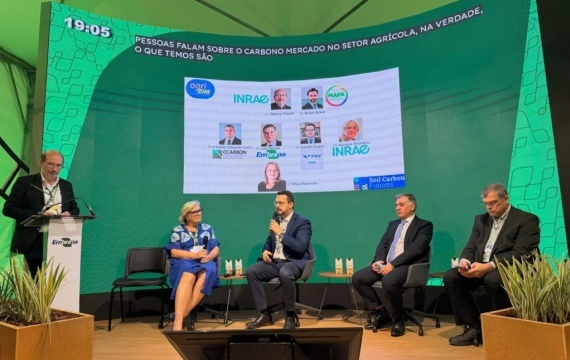FGV Researcher Discusses Scientific Standards and Carbon Farming Regulation at COP30
On November 13, 2025, the Agrizone at COP30 hosted the session “Alliance Brazil and EU to Promote Carbon Farming Practices via Public Policies Based on Science”, which brought together experts from Brazil and the European Union to discuss scientific foundations, regulatory challenges, and emerging opportunities for Carbon Farming.
Professor Daniel Vargas, from the São Paulo School of Economics (FGV EESP), emphasized that decarbonizing the economy goes far beyond a technical issue. According to him, the process involves scientific, economic, and regulatory dimensions that must work together to ensure credibility and efficiency:
“When we talk about accelerating the decarbonization of the economy, we are not only dealing with a scientific issue, but also an economic and regulatory one. We need to create an environment where unsustainable activities bear additional costs, while sustainable practices receive advantages such as access to cheaper credit and better markets.”
The researcher stressed that defining what is sustainable is not simple. Classification depends on standards built by science and regulation, not on visual or subjective perceptions:
“Green is not a color you can see with the naked eye. It is the result of standards developed by science and regulation. Our challenge is to internalize hidden environmental costs into the economic structure, creating clear rules to measure and price these impacts.”
Finally, Vargas warned about the importance of governance in regulating Brazil’s carbon market. He argued that it is essential to establish who will have the authority to define scientific and regulatory standards, ensuring trust between the private sector and the scientific community:
“The success of the carbon market depends on defining who has the authority to set scientific and regulatory standards. We need a legitimate, robust, and scientifically credible process capable of generating confidence in the private sector and the scientific community to implement a solid decarbonization system.”
In addition to Vargas, the session featured Thierry Caquet (INRAE), Bruno Brasil (MAPA), Suzanne Reynders (INRAE), Beata Madari and Márcia T. M. Carvalho (Embrapa Arroz e Feijão), Luis Barioni (Embrapa), Carlos Eduardo Cerri (CCARBON/USP), and Silvia Massruhá (Embrapa), bringing diverse perspectives on metrics, modeling, and climate governance.
Full coverage of Fundação Getulio Vargas’ participation in COP30, including agendas, exclusive content, and contributions from the institution’s researchers to global climate action, is available on the FGV Climate Agenda Platform. The opinions expressed in this publication are the sole responsibility of the contributing researchers and do not necessarily reflect the official position of Fundação Getulio Vargas.
